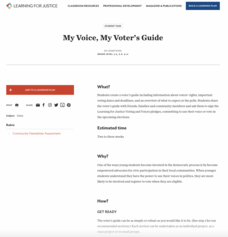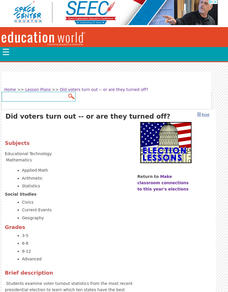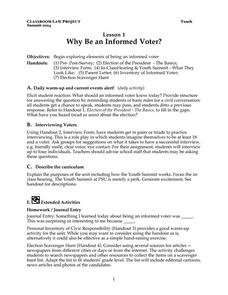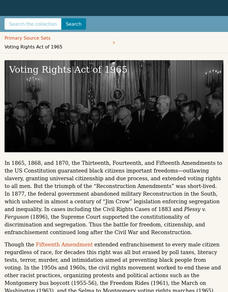Teaching Tolerance
My Voice, My Voter's Guide
Class members may be too young to vote, but that doesn't mean their voices are silent! After researching key information, such as policies for registering to what to expect at the polls, young scholars create and present election guides...
Curated OER
Voter Behavior
Transform your government students into informed voters with this straightforward worksheet. Five matching questions and five multiple choice questions test students' knowledge on voter behavior and political parties, and the format...
Carolina K-12
Preventing Voter Fraud or Encouraging Voter Suppression?
The issues of voter fraud and voter suppression are relevant in every election, local as well as national. Soon-to-be voters learn about a recent bill proposed in North Carolina, the Voter Information and Verification Act, and decide for...
Curated OER
We the People: A Study in American Voter Turnout: US Government
Students examine and compare voter turnout in US Elections. They write a letter to a favorite candidate or representative suggesting ways to increase voter turnout.
Center for Civic Education
Becoming a Voter
What are the requirements to register to vote in the United States? Young citizens evaluate this process by working with handouts, informational texts, discussion, and research, as well as complete a sample voter registration form.
Center for Civic Education
Lesson 3: Becoming a Voter
Who is eligible to vote in your state? Class members examine their states' voting qualifications, complete sample voter registration forms, and chart the elections scheduled.
Curated OER
Growing Voters and Election 2004: Get Out the Vote
Students examine the voting process, the reasons citizens should vote, and participate in a community drive to sign up new voters. After looking at websites, students create a poster that outlines the reasons to vote, participate in a...
Close Up Foundation
Teach the Vote
Why is voting important? A social studies unit presents a non-partisan approach to the importance of voting, to voting laws and procedures, and to resources that voters need to become informed voters.
Center for Civic Education
Becoming an Informed Voter: Creating Initiatives
Continuing from a previous lesson on how to read and analyze proposed legislation on election ballots, your class members will now practice writing up their own proposals for a new school rule or local ordinance that will be discussed...
Curated OER
Making Informed Decisions
Students discuss various issues of importance in the 1998 congressional and gubernatorial elections, create comparison charts of their states' candidates' positions on these issues, and decide which candidate they would vote for based on...
Curated OER
Did Voters Turn Out -- or Are They Turned Off?
What was the voter turnout at your last state election? Examine voter turnout statistics from the most recent election to learn which ten states have the best turnout record. This lesson offers election data, handouts, and worksheets.
Museum of the Moving Image
Evaluating Information: Focus on the 2008 Election
Just how true is the information contained in political ads? Determining the veracity of campaign ads from the 2008 presidential race is the focus of a lesson that introduces class members to several fact-checking resources.
Curated OER
Why Be An Informed Voter?
Learners analyze what it means to be an informed voter. They interview others in pairs and triads and role play the role of a voter. They create a list of what it takes to have a successful interview and interview four individuals.
Encyclopedia Britannica
Becoming US President
It's that time of year, and the year. Once again the race is on for the White House. It's important that young voters, and would-be voters, understand the process for becoming the United States President. Class members research the...
Curated OER
Campaign Trailblazers
Explore the backgrounds, qualifications, and platforms of the presidential candidates for the 2000 election. Though the lesson is outdated, the activities within the informational text could be good practice for your young learners as...
iCivics
Students Power Elections
A Students Power Elections resource guide provides would-be voters with the guidance they need to become voters. Included in the packet is information about voter registration and voting, how to research candidates and ballot measures,...
Classroom Law Project
What are some of today’s voting issues? Voting in Oregon, youth vote, and technology
The youth vote. Rock the Vote. Vote-By-Mail. Electronic voting. Class members investigate issues facing today's voters, and the ways they have adapted over the years to optimize voter turnout.
Center for Civic Education
Lesson 1: Who Can Vote in the United States?
The purpose of this first lesson plan in a series of five about enfranchisement and suffrage is to determine what class members already know, or think they know, about voting and voter registration. Groups answer questions on the...
Curated OER
Reporting Back
Students review what it means of being an informed voter. They present their cartoons or quotes work to the class. Youth Summit delegates share impressions of the Summit. They include new information that they obtained and individual...
Curated OER
Preparing for Class Hearing
Middle schoolers prepare and conduct In-Class Hearing. They comprehend what it means to be an informed voter. Pupils answer the following questions at the classroom hearing: "I learned that being an informed voter means _____., and Vital...
Curated OER
Voter Fraud: Are Ghosts Going To The Polls
Students research background material about voting in their community. They interview local/county election officials to see what is going on in the community. They also interview teachers, and students to determine if they are newly...
Digital Public Library of America
Voting Rights Act of 1965
Despite the passing of the Thirteenth, Fourteenth, and Fifteenth Amendments, as well as the passing of the Voting Rights Act of 1965, the struggle to ensure fair voter registration and election procedures continues. Young historians...
Newseum
Disinformation Nation: Separating Politics and Propaganda
Separating political rhetoric from propaganda is no small feat. Class members are challenged to examine two different sources about a candidate in an upcoming election and determine whether the primary purpose of the source is to inform...
Curated OER
Validating Votes
Explore the discrepancies in Florida's vote counting process in 2000 and 2002 with this New York Times reading instructional activity. Middle schoolers study the viewpoints presented in informational text, paying attention to how word...

























